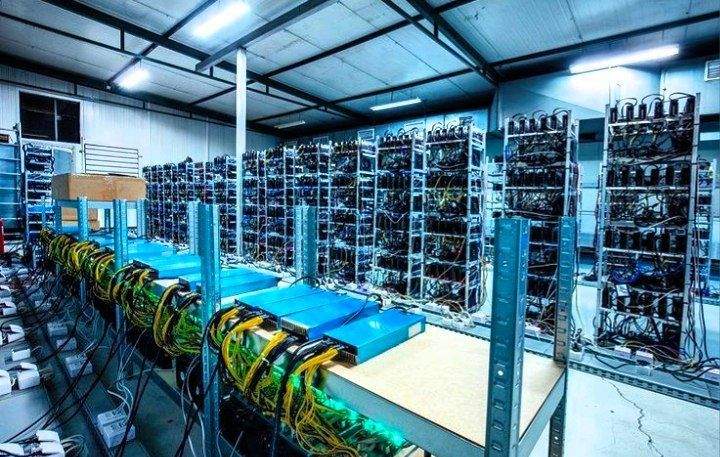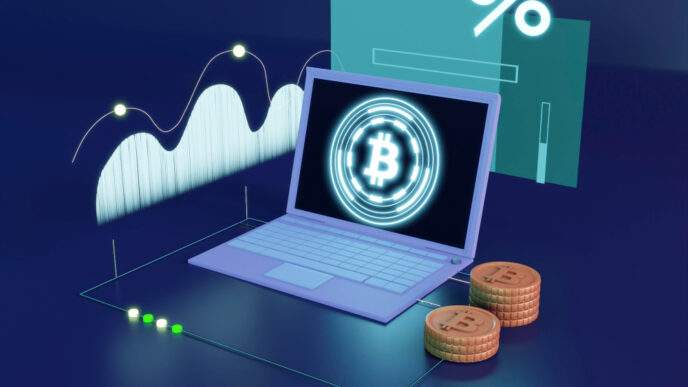In a quiet corner of the world, bitcoin mining operations in Africa are turning electricity into digital currency and in the process, redefining how value is created.
At its core, bitcoin mining involves validating transaction information before adding new blocks to the Bitcoin blockchain by competing to solve a cryptographic puzzle that meets a specific criterion.
Globally, mining plays a key role in keeping the blockchain decentralized and secure. The system depends on miners to verify and record transactions, mainly to prevent a problem called double spending, the digital version of using the same money twice.
To understand this better, imagine Charles sends $5 to Amanda. With physical cash, Amanda can trust the note is real and hasn’t been used elsewhere. But with digital currency, copying data is easy, so how can she be sure that the same $5 wasn’t sent to someone else too? That’s the exact problem Bitcoin mining helps solve.
In recent years, Africa has started to draw attention in this space, positioning itself as a key hub in global bitcoin mining. While there may be less than 2 million bitcoin left to be mined from the total 21 million supply, the rise of mining operations in Africa has sparked excitement, creating new jobs and drawing in foreign capital.
Although some countries still grapple with power shortages and the energy demands of mining, many citizens view bitcoin as a more stable store of value and a safeguard against the volatility of their local currencies.
At the same time, Africa’s wealth of hydro, solar, wind, and geothermal resources makes the continent one of the most promising regions for cost-effective and sustainable mining.
What Makes a Large-Scale Bitcoin Mining Operation in Africa?
It all starts with difficulty. Bitcoin mining isn’t just about solving a puzzle, it’s about solving one that keeps getting harder. Mining difficulty refers to how much computational work is needed to generate a number lower than the target hash.
This difficulty automatically adjusts every 2,016 blocks (about every two weeks), depending on how quickly miners solved the previous batch. If mining is fast and efficient, the network increases the difficulty; if miners drop off and block times slow, it reduces it, all to maintain a consistent block production time of roughly 10 minutes.
The significance of mining difficulty lies in the increased demands it places on mining operations. As difficulty rises, miners require more powerful hardware, cost-effective energy sources, advanced infrastructure, and substantial financial investment. These requirements distinguish large-scale mining operations from smaller, casual miners.
In short, it’s the difficulty of mining that births the need for large facilities, massive energy inputs, industrial-grade hardware, and significant financial investment, the very traits that define a “large” bitcoin mining operation.
This leads us to the 4 key factors that define large Bitcoin mining operations in Africa, each one a direct response to the growing demands of the network:
1. Facility size and infrastructure:
The physical size of a mining facility is a direct reflection of its capacity to house mining equipment and support systems. Larger operations typically have thousands of mining rigs installed, supported by extensive infrastructure such as advanced cooling systems and stable power supplies.
These are critical to ensure that the equipment runs continuously and efficiently, given the intense heat and electricity demands of mining.
While it is possible to mine Bitcoin using desktop computers or gaming rigs by joining mining pools, these setups are limited in profitability. Mining pools distribute rewards based on the computational power contributed, meaning small or less efficient machines earn only modest returns.
To compete effectively, mining operations invest in specialized hardware known as Application-Specific Integrated Circuit (ASIC) miners. These machines are far more powerful and energy-efficient than regular computers but require significant capital investment, with prices ranging from $4,000 to $12,000 per rig depending on their performance.
Large-scale operations typically deploy hundreds or thousands of these ASIC miners, which necessitates the large facilities and sophisticated infrastructure mentioned earlier. In this way, the size of the facility and the sophistication of the mining equipment are tightly linked, together defining the overall scale and capability of a bitcoin mining operation.
2. Hashrate contribution:
Hashrate refers to the computational power used to mine and process transactions on the Bitcoin network. A higher hashrate indicates a more significant contribution to the network’s security and transaction processing.
Large mining operations often possess substantial hashrate, measured in exa hashes per second (EH/s). For instance, as of July 2024, the Bitcoin network’s hashrate was approximately 733.41 EH/s.
3. Energy consumption and power source:
Bitcoin mining is energy-intensive. The total energy consumption of the Bitcoin network has been estimated at 175.87 terawatt-hours annually, comparable to the power consumption of Poland. Large mining operations often seek locations with access to cheap and reliable energy sources, such as hydroelectric, solar, or wind power, to reduce operational costs and environmental impact.
4. Financial banking and investor interest:
Significant financial investment is required to establish and maintain large-scale mining operations. This includes the cost of mining hardware, facility construction, energy procurement, and operational expenses. Companies with substantial financial backing can invest in cutting-edge technology and infrastructure, enhancing their mining capabilities.
Overview of Bitcoin Mining in Africa
Africa is beginning to carve out its share of the global Bitcoin mining market, which was valued at $2.45 billion in 2024 and is projected to reach $8.24 billion by 2034.
As Bitcoin’s value continues to rise, countries across the continent are positioning themselves to benefit, many by tapping into abundant renewable energy sources and taking advantage of regulatory ambiguity or excess energy production.
Ethiopia currently leads the continent in Bitcoin mining activity, with around 2.5% of the global hashrate reportedly coming from operations powered entirely by renewable energy.
This energy mismatch has attracted major miners from China and other regions, who see an opportunity to monetize surplus electricity. Ethiopia’s success showcases how renewable energy and mining can coexist sustainably while contributing meaningfully to state revenue.
Kenya follows closely behind. As the top geothermal energy producer in Africa, with an installed capacity of 863 MW, the country is using its energy advantage to support sustainable mining.
Nigeria is emerging as a serious contender. While not yet dominant, its large population, increasing tech engagement, and growing interest in using flared gas for mining signal potential for expansion. Nigeria’s complex but evolving regulatory landscape also leaves room for further mining developments as the government explores clearer crypto frameworks.
Malawi represents a more localized model of Bitcoin mining. By converting rainfall-powered microgrids into revenue-generating infrastructure, Malawi shows how small-scale mining can play a powerful role in community development and rural electrification.
In Libya, Bitcoin mining is technically illegal, but that hasn’t stopped it. Despite the ban, underground mining continues to thrive thanks to heavily subsidized electricity. In 2021, Libyan miners accounted for an estimated 0.6% of the global Bitcoin production, the highest in both the Arab world and Africa at the time. Today, mining reportedly consumes around 2% of the country’s electricity, even as it operates in the shadows.
Angola rounds out the list with limited public data but notable potential. The country struggles with energy inefficiencies, losing nearly 40% of its hydroelectric power during transmission. Some reports suggest Bitcoin miners are beginning to capitalize on this otherwise stranded energy, though large-scale operations are yet to surface.
What unites these countries is a shared set of conditions: untapped or mismanaged energy resources, an openness or gray area in regulation, and the growing understanding that Bitcoin mining can serve as a financial incentive to build and stabilize decentralized energy systems.
Whether through massive hydroelectric projects or rural microgrids, Bitcoin mining is emerging as both an energy monetization strategy and a bridge to infrastructure development across Africa.
Profiles of the Largest Bitcoin Mining Operations in Africa
1. BitCluster (Ethiopia)
As of 2024, Bitcoin mining in Africa is largely concentrated in East Africa, with Ethiopia leading the charge, contributing approximately 2.5% of the global hashrate, the highest on the continent.
Company
- BitCluster
Key Features
- A Russian-owned mining company operating a 120 MW mining facility in Addis Ababa.
- Benefits from cheap hydroelectric power from the Grand Ethiopian Renaissance Dam (GERD).
- Ethiopia contributes about 2.5% of global hashrate, the highest in Africa.
- Over 25 mining contracts signed with Ethiopian Electric Power.
2. Gridless (Kenya)
Countries like Kenya are embracing Bitcoin mining to boost economic growth, power rural communities, and put renewable energy to work.
Local miners such as Gridless are proving how hydro and biomass can fuel both sustainable Bitcoin mining and rural electrification across Africa.
Company
- Gridless
Key Features
- Focuses on small-scale, rural Bitcoin mining using hydro and biomass energy.
- Powers off-grid villages while mining Bitcoin, creating a dual economic and social impact.
- Partnered with HydroBox and other local infrastructure firms.
3. Trojan Minning (Nigeria)
With Bitcoin mining gaining momentum across Africa, local players like Trojan Mining which recently surpassed the 1 MW mark in Nigeria are becoming key references, offering valuable examples, insights, and models for the wave of new miners entering the space.
Company
- Trojan Mining
Key Features
- One of Nigeria’s largest known Bitcoin mining firms.
- Recently passed the 1 MW mining capacity mark.
- Gaining attention for developing in a challenging energy and regulatory environment.
4. Virunga National Park Mining Project (DR Congo)
In a world-first, Virunga National Park in the Democratic Republic of Congo launched its own Bitcoin mining operation, using the revenue to help protect the park’s wildlife and forest ecosystems.
Company
- Virunga National Park
Key Features
- A conservation-focused mining operation launched inside Virunga National Park.
- Uses clean hydroelectric power to fund wildlife conservation and park operations.
- Backed by international NGOs and climate-focused initiatives.
Challenges Facing Bitcoin Miners in Africa
1. Inconsistent Power Supply
A significant hurdle for Bitcoin miners in Africa is the unreliable electricity supply. Many countries on the continent experience frequent power outages and shortages, which can severely disrupt mining operations that require constant power to remain profitable. For instance, in nations like Nigeria, Ghana, and Kenya, inconsistent electricity can lead to substantial downtime for mining equipment, reducing overall efficiency and profitability .
2. Government Crackdowns and Regulatory Uncertainty
The regulatory landscape for cryptocurrencies in Africa is often ambiguous and varies significantly between countries. Some governments lhave imposed strict regulations or outright bans on cryptocurrency activities, creating an environment of uncertainty for miners. This lack of clear legal frameworks can deter investment and hinder the growth of mining operations.
3. Access to Mining Hardware and Maintenance Support
Procuring specialized mining equipment, such as ASIC miners, poses another challenge. High import duties, shipping costs, and logistical hurdles make it difficult for African miners to acquire and maintain the necessary hardware. Additionally, the scarcity of local suppliers and technical support services further complicates the situation, often leading to increased operational costs and downtime.
4. Infrastructure Limitations
Beyond electricity, other infrastructural issues impede mining activities. Limited access to high-speed internet, inadequate cooling systems, and insufficient data center facilities can affect the efficiency and scalability of mining operations. These limitations are particularly pronounced in rural areas, where infrastructure development is often lacking.
Despite these challenges, Africa holds significant potential for Bitcoin mining, especially with its abundant renewable energy resources.
Opportunities in African Bitcoin Mining: The Road Ahead
1. Africa as a future mining hub
Africa now accounts for about 3% of the global Bitcoin hashrate, with Ethiopia contributing 2.5% alone showing the continent’s growing role in global mining.
2. Potential for green and ethical mining
Countries like Kenya and Malawi use surplus hydro or geothermal energy to power miners, supporting sustainability while bringing electricity to underserved areas.
3. Partnerships and investment opportunities
Collaborations like NRG Bloom in Nigeria show how miners can partner with energy providers to unlock stable power and attract global investors to build infrastructure.
Conclusion
Africa is steadily carving its place in the global Bitcoin mining landscape, with countries like Ethiopia, Kenya, and Nigeria leading the charge.
From large-scale hydro-powered facilities to innovative rural microgrids, the continent is proving that it not only has the energy potential but also the ingenuity to support meaningful mining growth.
Despite infrastructure and regulatory hurdles, Africa’s unique blend of untapped renewable resources, local innovation, and increasing global interest positions it as a rising mining frontier.
If harnessed responsibly, Bitcoin mining could become more than just a financial opportunity, it could be a catalyst for energy development, job creation, and technological advancement across the continent.















